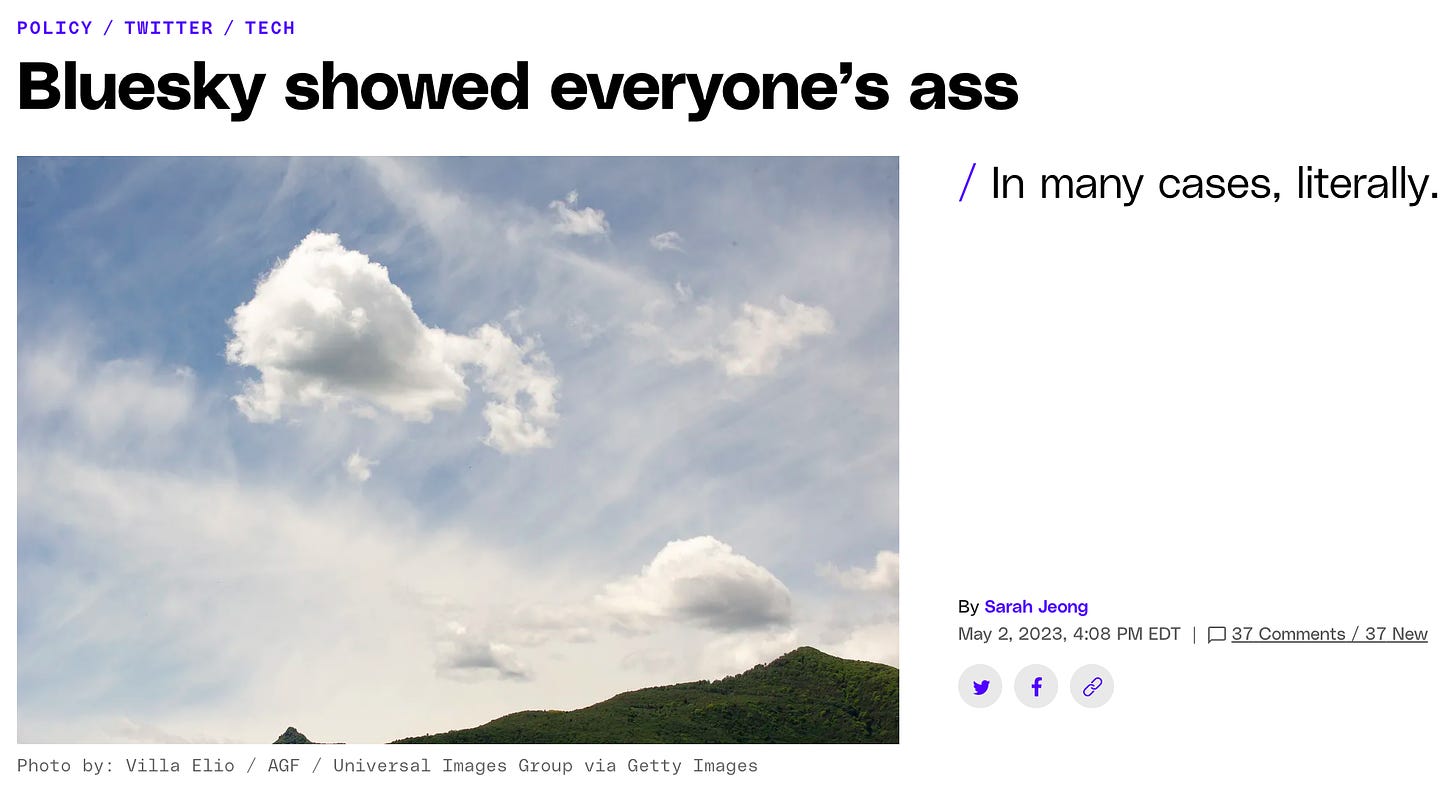Stop Trying to Make a "Good" Social Media Site
Erik Hoel at Intrinsic Perspective (Substack)

It’s an unkillable idea. Oh so predictably, some fresh-faced company will try to introduce a new social media website. It’s Twitter, but better! How it should be. Just in the past year, there was Mastodon (Twitter but decentralized!) and then there was Bluesky (Twitter but invitation-based, oh, and also decentralized!), and now there is Substack’s Notes (Twitter, but to follow people you need to subscribe your email). Now it’s been leaked that Meta will build a Twitter clone as well.
I was in Substack’s Notes beta, and I can attest firsthand—when it starts, people are always euphoric at the new site. It’s like everyone discovering some unblemished part of the cave wall. Here is a journalist at Verge over a month ago detailing the exuberance at Bluesky:
Bluesky is really, really fun. . . Very soon in my Bluesky journey, I stumbled upon a post from Jay Graber, the CEO of Bluesky, that helped me get a sense of what I was in for.
“It was getting pretty scene-y here so we just emailed 5K people from our waitlist, say hi when you see them trickle on!” Graber wrote. . .
Bluesky kept feeling good throughout the week. My feed wasn’t littered with angry posts about HBO Max’s change to Max, for example—instead, the people I follow seemed most invested in maintaining Bluesky’s currently positive culture. . . On Friday, people were posting pictures of their bookshelves: “shelfies.” It was enjoyable to scroll.
And here is Verge, the same outfit, just over two weeks later:

Now that the site is growing, guess what? It sucks, and has all the same problems as Twitter, from pornography to death threats. From the article:
This was not ideal for anyone, but it was especially not ideal for pundit and blogger Matt Yglesias, formerly of Vox.com and now a successful Substack writer. . . It’s not clear exactly what riled people up on Bluesky about Yglesias, though some cited his attitude toward trans rights issues. Regardless, on Thursday, his posts were under fire, with over a hundred replies ranging from merely hostile to descriptively violent. “WE ARE GOING TO BEAT YOU WITH HAMMERS,” said one user going by “hannah :)” who identified herself as a teen girl.
How lovely. This process will inevitably continue until the site becomes as terrible as all the big social media sites, transforming into places of witch hunts, derision, barely formulated thoughts, snuff videos, clickbait, and occupied with all your favorite anime avatars threatening to kill you. For a new social media website, going from “omg it’s so great we’re inviting another 5,000 people!” to “we will beat you with hammers” takes about two weeks.
And just to be clear: obviously the definition of “social media” is a spectrum. When I’m using it here, I mean mostly those sites on the end of one side of the spectrum, like Twitter and Facebook and Instagram—especially with its upcoming changes. Despite both being video sharing platforms, TikTok is further along the social media spectrum than YouTube, as it’s built on a constant stream of 30 second clips, whereas YouTube is built on 30 minute Mr. Beast videos. While other websites like Twitch or Substack have a social component, like accounts and subscriptions or followings, they don’t throw you into an all-to-all instantaneous web of interaction and virality. They don’t insert you into a realm governed by an always active group-mind focus of attention that sweeps, lighthouse-like, from subject to subject, and poor soul to poor soul.
To be sure, I like Substack’s Notes a lot more than Twitter right now. But I’m pretty sure that’s just because of its size. An analogy to cryptocurrency is helpful here: Bitcoin is too slow and decentralized to confirm transactions fast, and everyone complains about it, and so people create new alternative currencies with supposedly superior architectures. At first things go great, because no one is using the new blockchain and transactions confirm fast. But then, eventually, the new chain starts getting actually used, and transactions begin to slow to a crawl, and everyone realizes that they can’t outrun the problem that decentralized currencies are inevitably very slow, and that Bitcoin might be close to as good as it gets anyways. This is because there is an irreducible flaw—that decentralization is slow—that no design can fully get around. You’re limited by your materials.
Spinning up new social media websites mimics this, except what you are trying to outrun is human nature. No design of social media can get rid of what I like to call the “semantic nadir,” which is what you’ll inevitably experience if your tweet ever goes viral, wherein eventually someone will take your tweet in literally the worst possible way (there’s some classic examples of this, as generally if you say “I love cheesecake” it won’t be long before someone reaches to “Oh, so you hate regular cake”—that’s the semantic nadir).
Read the rest



